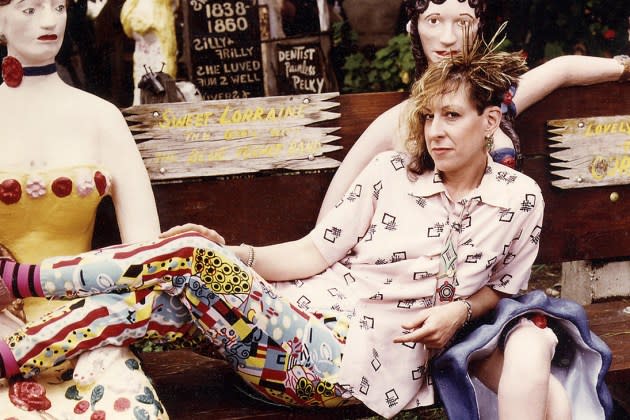‘The World According to Allee Willis’ Review: A Fascinating Doc Honors a Creative Force of Nature

The biographical documentary is a genre that lends itself to a reliable storytelling formula. First, we look back on the origins of the subject; we are introduced to some of the key figures that helped them along the way; we are shown the beginning of their career all the way to the end, and are then left to contemplate their legacy.
Due to the predictability of this format, these documentaries can often come off as by-the-numbers, taking us on a telegraphed emotional journey intended as a crowdpleaser. But every once in a while, there’s a subject who is so unique that their story elevates the formula. Allee Willis is one such subject, with a life story that’s energetic, colorful and invigorating to witness. Director Alexis Manya Spraic crafts a documentary that strives to be just as fascinating as its subject.
More from The Hollywood Reporter
The World According to Allee Willis, which premiered at SXSW earlier this month, brings us along on a journey to understand the artistic process of one of America’s greatest and most impactful creatives. Willis was a songwriter, producer, visual artist, production designer, art director and an expert party host. Working in music, television and even the early internet, Willis was a multimedia artist before that title even existed. She dedicated her life to the creative process, rarely taking a break from the moment she wrote her first song on a bus at the fresh age of 22 to being nominated for a Tony for The Color Purple musical three years before her death at 72. From painting and designing to computer programming, Willis did it all. Fifty years of artistic output is a very long time, and The World According to Allee Willis takes us through as many moments of its subject’s illustrious career as possible.
It helps that Willis was always recording video of her life, and Spraic uses that footage as the base of the film, allowing Willis to speak for herself as much as possible. A Detroit native, Willis grew up listening to Motown in the 50s and 60s while dressing like a tomboy and confusing her family. After the death of her mother during her teen years, Willis’ strained relationship with her conservative father pushed her to leave home and strike out on her own.
After releasing Childstar — her only solo album as a singer/songwriter — Willis was discovered by Patti LaBelle, jumpstarting her career as one of music’s most unique and prolific creators. Writing songs for The Pointer Sisters, Pet Shop Boys and, most famously, Earth, Wind & Fire, Willis became one of the most sought-after songwriters of the 70s and 80s. Her output was staggering, her most popular songs being timeless hits like ”September,” “Boogie Wonderland,” “Neutron Dance,” and the iconic Friends theme song “I’ll Be There for You.”
But Willis wasn’t satisfied with having only one occupation, using her newfound notoriety and connections to cultivate a community of fascinating figures. The original “Weird Barbie,” Willis had a playful pink home in the San Fernando Valley that was a kooky place for misfits, weirdos and artists. Among them were actress Pamela Adlon, director Paul Feig, comedian Luenell, Cyndi Lauper, and the late great Paul Reubens.
The most surprising interviewee here has to be Mark Cuban, whose unbridled love and respect for Willis and her work is genuinely touching to see. Every talking head interview indeed is gushing speaking of Willis as a loving friend, collaborator and artistic influence. Watching The World According to Allee Willis is like getting invited to a private party full of old friends and being welcomed with open arms. As the film goes on, it becomes clear that Willis and her friends were instrumental in setting the tone for the 80s — musically, aesthetically and culturally. It’s impossible to watch Earth Girls Are Easy and Pee-Wee’s Playhouse without seeing a little of Willis’ influence.
But what’s most fascinating and heartbreaking about Willis’ story is how afraid she was of her own queerness. While her art, home and even her clothes spoke loudly, she was never comfortable enough in her lifetime to call herself a lesbian. And yet we as viewers have the pleasure of hearing from her longterm partner Prudence Fenton about their beautiful life together. Like many women of their generation, they fell in love later in life, caring for each other both emotionally and artistically.
The footage of them together speaks louder than any of Willis’ words ever could. Much like recent documentaries Loving Highsmith and Rock Hudson: All That Heaven Allowed, The World According to Allee Willis exposes vital queer history that reminds us that there is more to our culture than the heteronormative stories audiences have been fed for so long. Even though Willis never publicly came out, the queerness of her work is not only clear, but enduring.
Best of The Hollywood Reporter

 Yahoo News
Yahoo News 